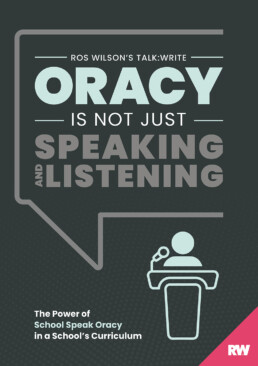
Ros Wilson's Talk:Write
Oracy
- Speaking and listening is not oracy.
- Oracy is not just speaking and listening.
- Oracy gives us the gift of oration which is the ability to hold listeners' attention through a powerful and passionate performance.
- Oracy is one code of the many codes of speech. It is a powerful tool that you can choose to use - or not - when the moment calls for it.

Oracy Is Not Just Speaking and Listening Video CPD and Book
Our approach gives pupils the gift of oracy and the powerful choice of different modes of communication. These tools enrich experiences and enhance opportunities for all. This approach is aimed at pupils from 6 to 13 plus in English-speaking schools. It is a stand-alone approach to teaching oracy as well as an additional element to the Talk:Write programme.
Oracy Free Resources
School Speak Sentence Openers is an A5 document that would be ideally printed as a booklet of 4 A5 pages on one folded A4 sheet.
Our oracy certificates offer a fun way to celebrate your successes.
What Is Oracy?
Oracy is a powerful and highly important skill that takes the literal hearing, understanding and repeating of much of speaking and listening to a new plane of:
- Hearing: the ability to sustain listening and reflect on what is said.
- Understanding: the ability to interpret what is heard and to react or respond if required.
- Absorbing: the ability to internalise what is heard, integrating it into existing beliefs and passions for future purpose.
- Embracing: the ability to envelop the new learning with passion and caring.
- Practising: the ability to enable a performance that reflects the understanding and passion held.
- Performing with Passion: the ability to share passion and understanding so that the listener experiences and embraces that same emotive exposure.
When these steps are fully integrated and implemented, oration inspires, informs and imbues the listener in the same way that the original experience did for the speaker.
How Is Oracy Different From Speaking and Listening?
There is no doubt that learning the skills of true oracy enriches vocabulary and language structures far beyond the basics of speaking and listening. Currently, however, oracy is often interpreted as speaking and listening, and the two terms are used interchangeably. In reality, oracy brings a quality of language, phraseology, passion and performance that everyday speaking and listening does not often achieve and rarely aspires to.
Oracy is Andrew Wilkinson’s term to describe Basil Bernstein’s elaborated code of speech when the focus is embraced and performed with passion. Within oracy, elaborated speech becomes a creative construction of language selected for impact and emotion.
Oration Is a Powerful Choice
The greatest orators did not communicate through oration in their daily life. Their orations were performances planned and prepared for purpose. So, the most effective speakers can code switch between informal daily speech, effective and clear elaborated speech, and actual performance through oration.
Besides impacting on all learning, oracy greatly enriches all forms of communication, including written prowess.
We call the oracy code of speech ‘school speak’ because it is not acceptable to impose this form of speech on children to the detriment of their home speech or cultural speech. It is only to be used in school (except when practising at home) until the child is old enough and able to make a genuine choice to use it.
School speak is an alternative form of speech – an oration to be transitioned into with ease when the child is aware that it is appropriate. As the child matures, they may elect to use this form of oracy for presentations, debates, dialogue, discussion, interviews, either in or out of school.
Oracy Blogs
Talk:Write and Oracy
Introducing oracy in the classroom is explained in detail in my Talk:Write programme. Our publication Oracy Is Not Just Speaking and Listening is an extension to Talk:Write as well as a stand-alone initiative.
Whatever the context of a school’s launch into oracy, I still recommend that it is introduced as one stage in the process of developing speaking and listening in a school.

